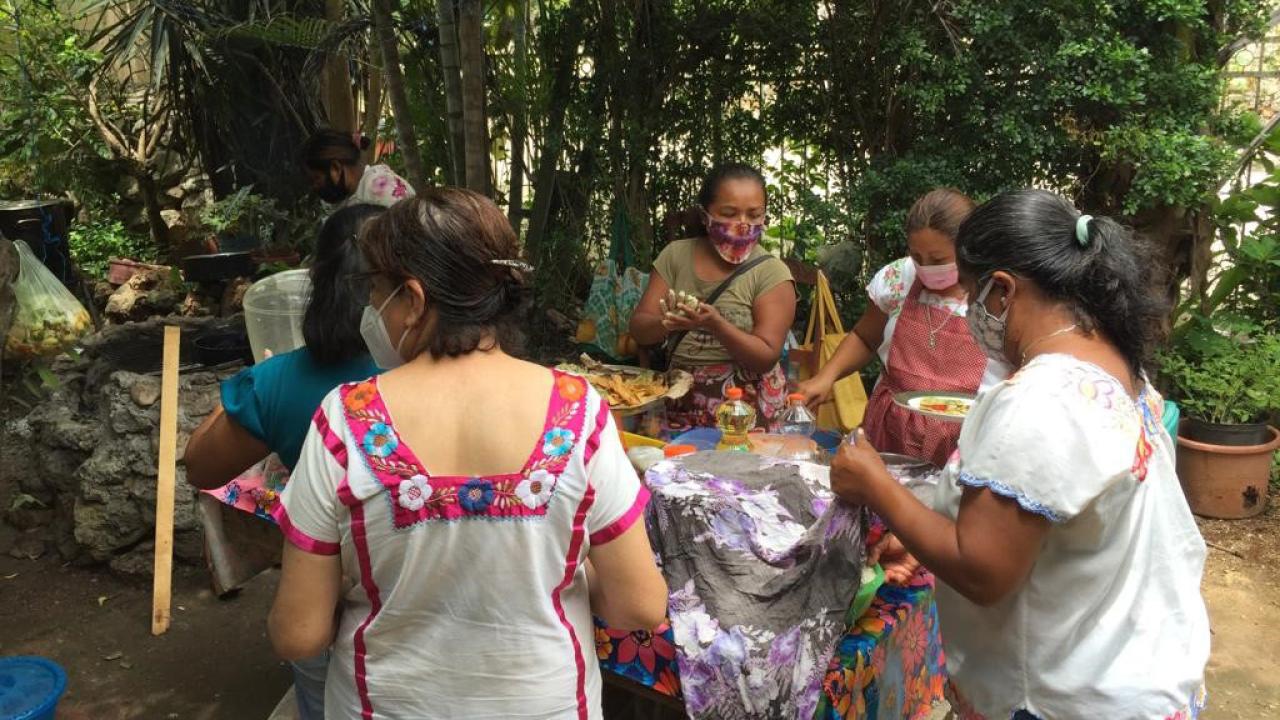
Crump, Zepeda win grant for sustainability in Mexico
“Opossums” defy economic hurdles to feed their children
Ana Zepeda has received a $7,300-grant to help women in southern Mexico plant a community garden, intended to provide better nutrition for their children and keep them in school.

Zepeda developed the project as part of her doctoral dissertation in the lab of Amanda Crump, and she’ll start the work later this year. The grant, from the UC Davis Advancing Sustainable Development Goals program, furthers the university’s commitment to support development at home and around the world.
“I will be working with a group of women who started a community kitchen in Mérida, as a result of job loss during COVID-19,” Zepeda explained. “They started pooling their money to lower their food costs and feed their children. They soon expanded and now feed two meals to about 50 kids a day.”
The 25 women in this tourism-dependent community call themselves Las Zarigüeyas, or “the opossums.” So far, the women make money to buy ingredients by collecting recyclable plastic and selling it.
“One of the main motivations for the work of Las Zarigüeyas is to provide meals to keep children in school,” Zepeda wrote in her proposal. “We will help them establish a kitchen garden with vegetables and herbs, using agroecological methods, and we will also provide workshops on how to maintain it,” she added. She expects the garden would add stability to the meals program, improve the students’ learning, and lead to a decrease in inequality in educational achievements compared to children in the city’s wealthier neighborhoods.
Multiple disasters challenge food security
Zepeda also is looking at how multiple challenges and disasters pile on top of each other to make it even harder for such families to eat. Las Zarigüeyas already face hurdles for being women, being poor and living in an area – on the Yucatán Peninsula – that sees hurricanes, heavy rain and flooding.
“Our research aims to understand how food security is impacted by compounded disasters and what strategies communities use to be more resilient,” Zepeda said. She will work with Las Zarigüeyas to create a plan for reducing risk when weather disasters strike, helping them thrive for the long-term. She noted that women and poor people typically are not involved in disaster planning, so their needs often go neglected.
“The next step for them is to assess how they can continue their work and solidify their presence in the community,” Zepeda said. “We will conduct participatory research to identify the group’s needs and disaster preparedness, identify sources of long-term funding and write competitive grant applications.”
For that part of the project, Zepeda will work with Dolores Molina-Rosales, at the Colegio de la Frontera Sur, Campeche, Mexico.
“This award helps our team continue to understand the impacts of compounding disasters on vulnerable people engaged in food production,” Crump said. “Geographers like Ana can add a unique perspective on rural and urban farming strategies used to be more resilient during disaster.”
Part of UC Davis commitment to sustainability

The campus Global Affairs office offers Grants for Advancing Sustainable Development Goals as a part of a partnership with Grand Challenges, Sustainability and the Office of Diversity, Equity, and Inclusion. These team-focused grants fund global and multidisciplinary programs that enhance UC Davis’ connections to the UN Sustainable Development Goals.
Seen as addressing universal human needs, the sustainable development goals were adopted by all United Nations member states in 2015 as part of the 2030 Agenda for Sustainable Development. The 17 goals – such as ending hunger, ensuring clean water, reaching equality for women and combating climate change – provide a common global framework to achieve sustainable development across economic, social and environmental dimensions.
At UC Davis, Zepeda’s project is one of five selected for the grant program, together contributing to 13 of the 17 sustainable development goals.
Media Resources
- Trina Kleist, UC Davis Department of Plant Sciences, tkleist@ucdavis.edu, (530) 754-6148 or (530) 601-6846
